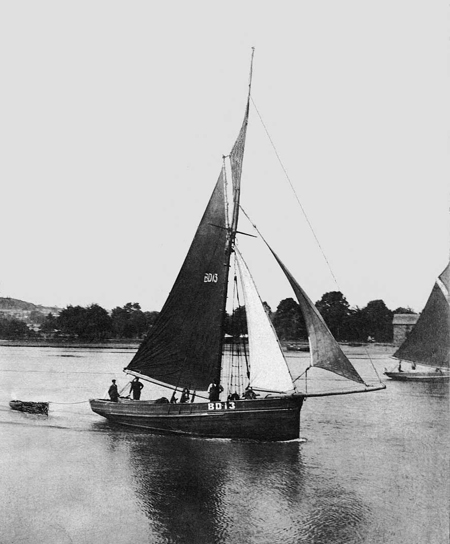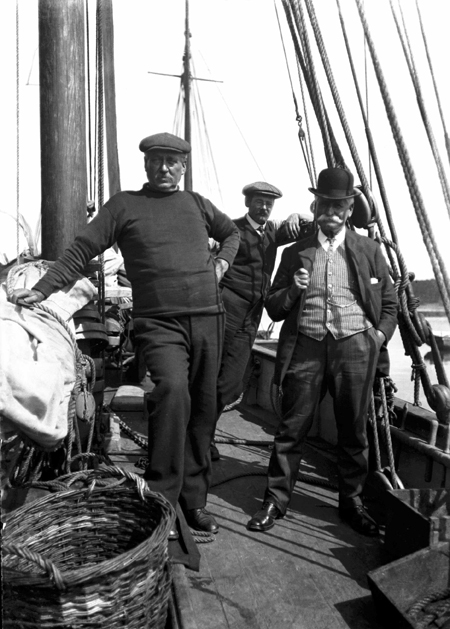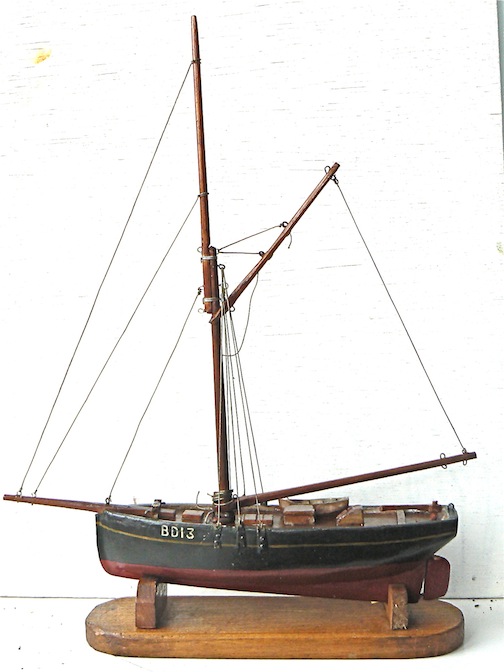FREDERICK WILLIAM
1859 - 1939
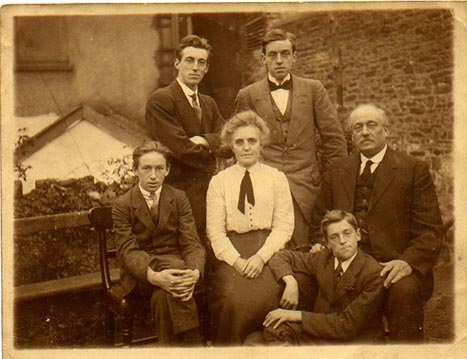
Frederick and Deera Prance with four of their five sons
from left to right: Arthur,
Bertram, Clarrie & Claude. Photo taken about 1915
Frederick William Prance was born 22nd. February 1859 the eldest son
of William and Harriet. He married Deera Hollway on 4th. December
1884 at the Zion Chapel, Silver Street, Bideford. Frederick later
became known as Captain Prance when he skippered his own fishing
vessel the 'Deera' which was based in Bideford but trawled in the
once fertile waters of Bideford Bay from Hartland to Morte Point and
around the island of Lundy. In the early part of the twentieth
century these waters teemed with an abundant supply of herring,
mackerel and other fish and provided a good living for those
prepared to face treacherou' Atlantic gales and the rocky coastline
for which the area is famous. The narrow entrance from the Bay into
Appledore Pool known as 'The Bar', is bordered by shifting sandbanks
and a trap in heavy weather to anyone not familiar with its dangers.
Fortunately Frederick was a tall strong man and an able swimmer and
is reputed to have saved a number of lives during his career at sea.
One such incident occurred in April 1909 and was fully written up in
the Devon Weekly Gazette. The French ketch "Andree" manned by the
Captain, his wife and crew of four and carrying 140 tons of coal,
struck a rock off Boggy Point and was foundering. Frederick,
accompanied by his permanent mate John Folley, was trawling in the
bay in the "Deera" and saw the distress flag flying on the "Andree".
He immediately hauled in the trawl and made for the stricken vessel
which was about three miles distant. The head of the "Andree" was
down but their small boat was launched with three of the crew and
the Captain's wife, their belongings, boxes, ship's papers, a drake
and a poodle. Everything was done to get the people aboard the
"Deera" as soon as possible and they were just putting the
Captain'\s wife into the trawler when the ketch suddenly went down
in eight fathoms of water leaving the Captain and one of his crew in
the water. The wind was strong with a heavy sea and as the two
unfortunate men were being buffeted about prompt action was
necessary if their lives were to be saved. Without waiting to get
any of the others aboard, Captain Prance made his own boat fast and
went to the rescue of those who were struggling in the sea., and
after tacking twice while it was blowing a gale of wind he, with
some difficulty, succeeded in rescuing them in an exhausted
condition. Once they were all aboard the "Deera" he was able to
bring them to Bideford Quay. The "Andree" having sunk in a position
in which she was a danger to navigation was later blown up by the
Trinity Boat. It was generally acknowledged that but for the skill
and bravery of Captain Prance there is little doubt that the six
french would have perished. In recognition of this, the Royal National Lifeboat
Intitution later presented Frederick with a fine pair of binoculars
made by Ross of Bond Street. Copies of newspaper articles from
the 'Bideford and North Devon Gazette' giving full acoounts of
the incident can be found at the
bottom of this page.
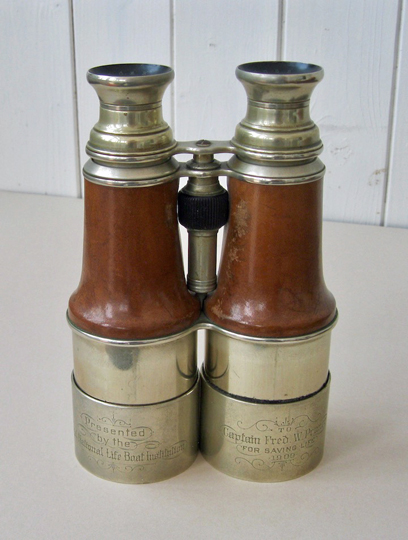 |
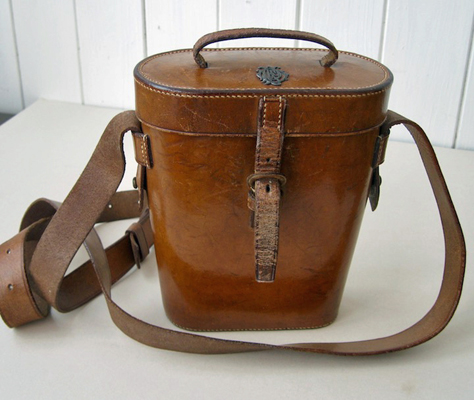 |
| Binoculars presented to Captain Prance by the RNLI |
|
The presentation took place on 16th June 1909 at Petticombe on the occasion of the annual fete of the Appledore branch of the RNLI.
The Mayor, Mr H R Bazeley, presented Captain Prance with the binoculars and his mate John Follet (Folley?) together
with Mr Tom Pridham of the MORNING STAR cheques for two pounds.
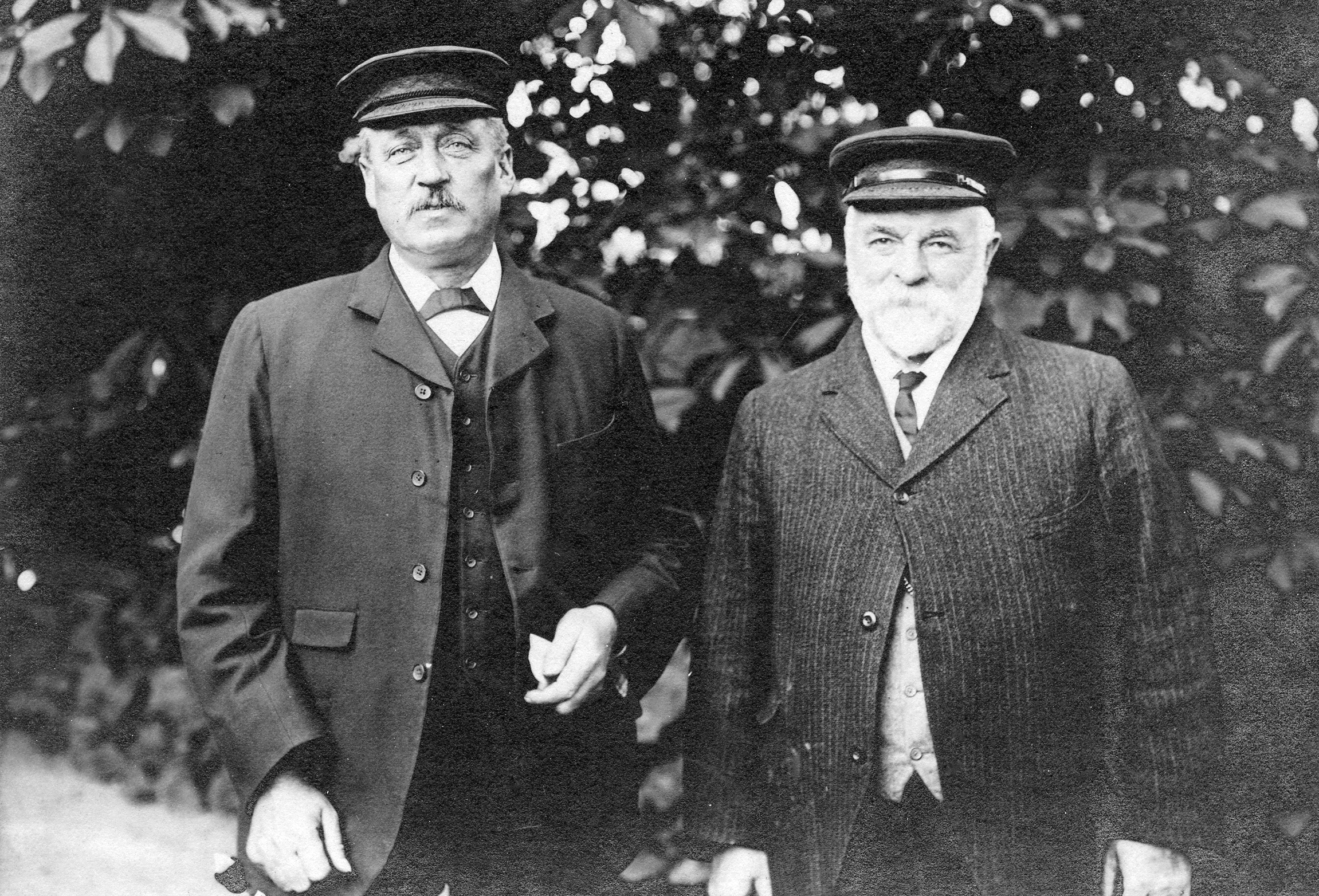 |
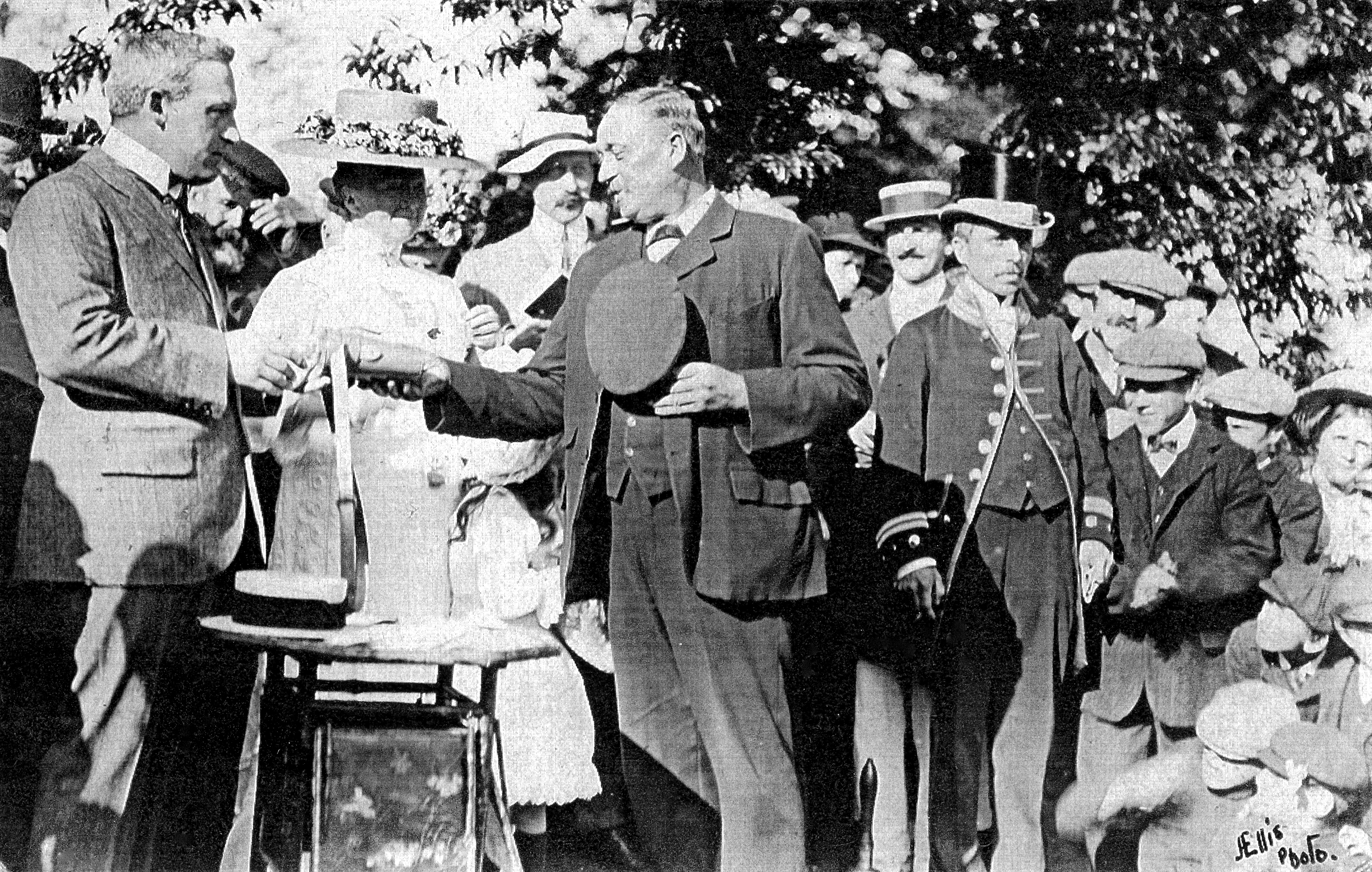 |
| Cartain Fred Prance (left) and Mr Tom Pridham (right) |
|
(The above photos of the presentation are reproduced by kind permission of the North Devon Maritime Museum at Appledore)
Frederick and Deera had five adult sons. One of them, Claude,
suffered a severe injury while a baby and although handicapped for
life had talents to compensate. Bertram became a well known
cartoonist and illustrator and his profile is available on this
site. Towards the end of his life Frederick suffered terribly from
asthma so much so that it became a struggle for him even to walk
from one end of the house to the other without inhaling a strange
mixture which he burnt on the top a tin. I only knew him in these
latter years. Deera Prance on the other hand was a slight woman with
straight back, very serious, quite strict in her outlook and a great
character. She soldiered on until she was 91 and was very fit almost
until her end. When she knew her time had come she said "Call the
brothers"! Dutifully they all came and she then died peacefully.
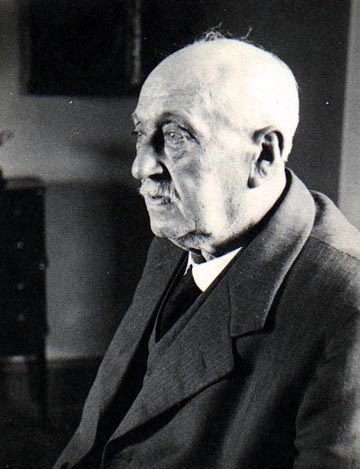 Captain Frederick Prance aged
about 75
The 'DEERA' sailing up the
Torridge to moor.
Captain Frederick Prance aged
about 75
The 'DEERA' sailing up the
Torridge to moor.
CHILDREN
Frederick Albert b.31st March 1886 (Early death presumed)
Frederick William b.28th. June 1888 d. 15/3/1974 m. Bessie Pike
1913
Bertram Stanley b.5th. December 1889 d. 9/8/1958 m.Kate Lily
Macfarlane 1915
Clarence Lythaby b.5th. July 1895 d. 15/8/1952 m.Ethel Grace
Wilkinson 1926
Claude Albert b.12th.January 1897 d. 28/7/1980 unmarried.
Arthur Edgar b.10th. September 1899 d.28/10/1977 m. Evelyn
Phyllis Young 4/7/1929
Deera Prance died 2nd.March 1952
Bideford Burials
Captain Frederick Prance on board DEERA with two visitors.
John Follet on left behind
the mast.
Model of the DEERA made by Claude.A.Prance
THE BIDEFORD & NORTH DEVON WEEKLY GAZETTE
and Devon & Cornwall Advertiser
TUESDAY APRIL 27 1909 No.2,983
FRENCH CREW RESCUED
BIDEFORD CAPTAIN'S SMART SEAMANSHIP
VESSEL LOST OFF THE BELL BUOY
A fine display of cool and masterful seamanship in Bideford Bay on Wednesday afternoon
last resulted in saving the lives of the Captain, his wife and four men, who formed the
crew of the French ketch "Andree." Captain Francois Cabon of Morlaix, is the owner of
the vessel, which was well found, a seveteen year old craft 150 tons dead weight, but
sailed from Cardiff on Wednesday morning with 140 tons of coal for Laurante. The "Andree"
had a fresh breeze down Channel, but struck a rock just off Rockham Bay, Morte Point,
and sprung a leak. The rock is not unknown to local mariners, and more than one tale of
mishap and disaster is recorded in connection therewith, Bideford and Appledore craft
being among those which have had narrow escapes in the past. The rock, it is said, is
not marked on the charts, and being underwater at low tides is particulrly dangerous.
There is a good depth on each side of it, and some vessels take the risk and pass it
on the shore side, although this is not the general practice. The "Andree" promptly
sprung a leak after the impact, and the Captain at once ran up a signal of distress,
flying the French flag at half mast. There were on board with Captain Cabon, his wife,
who does not usually accompany him, and was in fact, taking a health trip, and a crew
consisting of Yves Allan, Yves Gegou, Francois Allan and Yves le Bonniee. A heavy
South-east gale came on and the Captain, still keeping his distress signal up, came
round Baggy Point, passed off Croyde signal station, and across the Bay towards the Bar.
The vessel was making water badly, but there was no sign of the signal being seen
from the shore.
Here, the story may be taken up by Mr. Fred Prance, of Bideford, who was fishing in the
Bay, with his mate, John Folley, in his trawler "Deera" (BD 13). Mr. Prance states that
he was trawling about 2 o'clock when he saw a signal of distress flying at half-mast from
a ketch, which was then about three miles away, and about a mile North-West of the Bell
Buoy. He immediately hauled in the trawl on board and went to the vessels assisstance.
On approaching, he found she was in a sinking condition. She was down by the head and
awash at the horse-holes. He stood by until the ketch launched her boat with three of
the crew and the Captain's wife and their belongings, boxes and the ship's papers, a drake
and a poodle dog. Everything was done to get the people aboard the "Deera" as soon as
possible, and they were just putting the Captain's wife into the trawler when the ketch
suddenly went down in eight fathoms of water, leaving the Captain and one of the crew
(the latter having a life-buoy) in the water. The wind was very strong, and making a
heavy sea, the two unfortunate fellows were being badly buffeted about. Prompt action
was necessary if their lives were to be saved. Without waiting to get any of the others
on board Captain Prance had the boat made fast, and went to the rescue of those that were
struggling in the sea, and after tacking twice while it was blowing a gale of wind, he with
some difficulty succeeded in rescuing them in an exhausted condition. When they were all on
board the trawler it was about 3.30, and he brought them to Bideford Quay, which was reached
without further incident, The "Andree" being left North-West of the Bell Buoy with her
mizzen mast just showing above the water.
As told by Mr. Prance, his rescue of the Frenchmen would seem a very simle matter, but
those who know the Bay in a gale and the spot where the rescue was effected, are full well
aware that it was far from a very simple matter, but one calling forth a high degree of
pluck and skill in seamanship, to tack twice and bear down close to the wreck and pick up
the two men without mishap. What the fate of the crew would have been had he not providentially
seen the signals of distress, there is not very much doubt. Those who are used to going out in
the lifeboat say in such weather it would have been impossible for the Frenchmen to have
landed in their boat, and their only hope would have been to have kept her head to the
weather, on the off chance of being picked up by some passing craft.
On arrival at Bideford Quay the shipwrecked crew were taken into the Bideford Harbour Office,
where the Harbour Master, Mr. Sidney Prance (a brother of Mr. Fred Prance, of the "Deera")
and his wife very kindly put them up a good hot meal, of which they were all in need after
their trying experience. They were all wet through when rescued, but their clothing had
partially dried during the sail up the Torridge. They were afterwards handed over to the care
of Mr. Stapledon, the French Consular Agent, and were accomodated at Mr. Hopkin's Three Tuns Inn,
where they were made most comfortable. Mr. Pascoe, the local representative of the Shipwrecked
Mariners Society, also interested himself in the case, but found that the Consul had taken
charge of it and was making arrangements for the return of the men to their homes.
Only the Captain could speak a little English, but they were all high in their praise
of the efforts of their rescuers, and thanked them and all who had shewn acts of kindness
to them during their stay in the borough. Captain Cabon, it appeared, had been at sea a
good many years, and the vessel, for which he gave £800, was his own, and, unfortunately
for him, not insured, although the cargo was. He had only just spent £80 on new sails for
the craft before leaving Cardiff, so that his loss is a very heavy one.
When Captain Prance bore down on the Frenchman, he could not induce them for some time to
put off in their boat. This reluctance was afterwards explained by Capt. Cabon, who said
he did not think his vessel was going to flounder so quickly. He seems to have given his
orders most cooly, and to have acted with considerable determination under trying circumstances.
He is himself a very powerful swimmer, and his idea was to send two of his crew with his wife
and the yougest boy and some of their belongings to the trawler in the ship's boat, and for
the boat then to return for him and the next yougest hand, who he provided with a life-belt.
But as it happened, the vessel suddenly made a plunge and sank before the boat could return.
The boy was more exhausted when picked up, and Capt. Prance bears testimony to the splendid
swimmer Capt. Cabon is, though he was obviously sufffering from the buffeting he received,
when, on the second tack of the 'Deera' he was caught and dragged into the boat. When he was
asked subsequently if he thought he should be drowned he replied in the negative, and added
in english 'me swim a long time'. But it was evidently the opinion of all on board the 'Deera'
that he had been swimming quite long enough.
A curious little slip, it might be here mentioned, found its way, probably owning to a printers
error, into one of the published reports of the incident. It being stated that the Captain screamed
when the ship went down. This was a quite unintentional slight upon the Frenchman, who had
shown himself every inch a seaman throughout the episode. It was the Captain's wife who had
screamed when she saw the vessel disappear and her husband thrown into the water, and being
in poor health it was not surprising that she was still in rather a nervous condition when
Bideford was reached.
The Captain and most of the crew were subsequently sent to Southampton, en route for St. Malo,
while one was sent by the french Consular Agent to Plymouth, subsequently leaving for Brest
for his home in Quimper. Interviewed in Plymouth, he bore out what had been gleaned in
Bideford, that all on board had a very narrow escape indeed of being lost. He expressed
great gratitude to Mr. Prance and to those who had treated them so kindly at Bideford.
The "Andree" having sunk in a position in which she was a danger to navigation, a Trinity
Boat went out on Sunday afternoon and at low tide successfully blew her up.
(The above article also included photographs of the "Deera" and Captain Prance)
"Much excitement" (writes our Appledore correspondent) "was caused on Wednesday afternoon
when it was reported that a French ketch had sunk in the Bay, the crew having a narrow
escape. There was much comment because signals of distress shown by the crew were not observed
at Appledore, but out of justice to the sailors it is only fair to state that when vessels
fly their flag at the mizzen (as was the case of the French vessel) it is taken as a signal
that a pilot if required. No doubt (the correspondent adds) an enquiry will be made as to why
the lifeboat was not launched, and it really seems hard that vessels should be in distress
and no assisstance rendered. There have been several mistakes of late, and it is hoped that
something will be done and arranged so that in future assisstance will be rendered when required."
In a leading article on Friday, the "Western Morning News" said :- "Contained in the particulars
of the loss of the French ketch "Andree" in Barnstaple Bay, which we reported yesterday, is
another strong Indictment against the look-out system on the North Devon shores. By a succession
of unseen wrecks this locality has earned for itself the unenviable title of "the unwatched coast"
and successive public enquiries have failed to produce any tangible result. Mr. Soares, the member
for the division, has been appealed to again and again to press for some method of rendering the
navigation of Barnstaple Bay more safe, and has been instrumental in having additional land lights
provided, but strenuous as his exertions have been in regard to the watching, the results have been
nugatory, and the Board of Trade inquiries proved as barren of result as they have been costly. Local
mariners have asked time and again, "How long is this to last?" Have they still to ask in vain?
Before the coast can be properly watched, there must be an end to the system of "discretionary"
watches which coroners' juries have been told are kept in North Devon on some daylight stations,
where there is discretionary power whether the watch shall be continued after dark, or the coast
then left to look after itself. A revison of the duties of coastguards generally would have a salutary
effect, and the loophole should not be left for either chief officer or boatman to explain,
when a wreck has not been seen, that "the duty of the coastguard is to prevent smuggling" or
that "the lookout is war signal station."
Again, there should be more cohesion between the coastguard and the Lifeboat Institution. The
latter body, it is understood, is at all times willing to co-operate with the coastguard, and
in many instances where the Institution officers keep no lookout - and it is not part of their
regulations to do so - they depend on the coastguard to give them warning of wrecks. At Appledore,
for instance, the lifeboatmen only keep a lookout at night in very rough weather, and then at the
discretion of the coxswain. notification of wrecks to lifeboats where they are stationed, has crept
into the routine of a coastguard's duty, but it should occupy a more important place in their
regulations,
In the instance of the "Andree" under notice, we have the old, old story of signals of distress
being shown and no notice taken from the shore. In the case of the "Madeleine" the distress signals
were said to have been misunderstood - that vessel was also thought to have been at anchor, when as
a matter of fact she was almost on the Pebble Ridge at Westward Ho! Which has never been regarded as
an anchorage. There, however, the coastgiard had the excuse that it was a squally night, although
that to a landsman would rather appear to be a reason for a sharper lookout.
But Monday's disaster occured in broad daylight, at two in the afternoon, and the "Andree" leaking
and sinking, with a gale blowing, met the fate of the "Phyllis Gray", with no answer from the shore
to the signals of distress. For some hours the "Andree" must have been visible from the different
coastguard lookouts, and for two hours Captain Francois Cabon states he had his flag at half masted.
In this he is not altogether un-corroborated, for Capt. Fred Prance, the master of the Bideford
trawler "Deera", whose plucky rescue of the Frenchman deserves tangible recognition, saw the signal
of the "Andree" at 2 o'clock, while the vessel did not go down until about 3.30. Possibly the
coastguard saw the "Andree" - their regulations prevent them giving information to the press - but
if they did one is entitled to ask why the lifeboats were not notified? This is where complaint is
found with the system. To answer that the "Deera" was already on her way to the rescue is insufficient,
for when Captain Prance saw the "Andree" she was three miles away, and before he could start to get
to her he had to hawl in his trawl. Either the Appledore or the Braunton lifeboats could have effected
the rescue had the crews been summoned, and but for the providential presence of the "Deera" the whole
of the Frenchmen must have lost their lives in the absence of the lifeboats, as their own boat, large
as it was, could hardly have lived in the seas that were running.
The coolness and pluck of Captain Fred Prance in the manner in which he effected the rescue is the
admiration of all who know the Bay. His "Deera" is perhaps the smartest trawler on the Torridge,
and when he brought up to the sinking Frenchman three of the crew and the captain's wife left the
vessel in their boat, Captain Prance got Madame Cabon aboard when he observed the ketch disappear,
and knew that the Captain and the cabin boy, Yves Le Bonniee, must be in the boiling surf. To
attempt to get these three Frenchmen - Yves and Francois Allan and Yves Gegou - out of their
boat and aboard the trawler would have possibly meant losing those who were in the water, so Captain
Prance made fast the boat, and, towing her behind, tacked twice in the gale, and running down on the
boy, picked him up in an exhausted condition, only the lifebuoy had kept him afloat. Captain Cabon,
is a strong swimmer, and kept up until Captain Prance and the crew of the "Deera" had completed a
rescue that was only accomplished by good seamanship and plenty of pluck in manouvering a vessel under
conditions calling forth the indominitable heroism of the British mariner.
The "Andree" now lies about three-quartes of a mile north-west of the Bell Buoy, and being in the fairway,
it has been reported to Mr. Stapledon, The French consul at Bideford, that she will probably have to be
blown up for the safety of navigation. At the last Board of Trade enquiry at Bideford, it will be
remembered, the Barrister instructed by the Board of Trade passed some severe criticism on the action
of the Press in their strictures on the efficiency of the look out system. It would be better if the
authorities would render the strictures unnecessary than criticise them when made.
THE BIDEFORD & NORTH DEVON WEEKLY GAZETTE
and Devon & Cornwall Advertiser
TUESDAY APRIL 27 1909 No.2,983
The Wreck in the Bay
The loss of the French ketch "Andree" of which full details are given in another
part of this issue, has again raised the vexed question of the watch on the North
Devon coast. And in connection therewith the Royal National Lifeboat Institution is sometimes heard
mentioned in a manner which shows that, despite the clear statements in regard to the matter, made at
recent Board of Trade enquiries, into the loss of the "Phyliss Gray" and the stranding of the
"Madeleine", and at the still more recent annual meeting of the Appledore branch at Bideford, the
position of the Institution in reference to watching is in some quarters not yet thoroughly understood.
It cannot be too well known that the Lifeboat Institution emphatically does not undertake to keep a
lookout around the coast, or in any way hold itself responsible for doing so. It would, it is submitted,
be altogether preposterous to expect such a huge task to be undertaken by an organisation run entirely
by voluntary contributions. At the same time, it is the custom at some of the local stations to keep a
look-out but only at night, in very rough weather, the watch being set at the discretion of the coxswain.
No watch would therefore be kept at the time the "Andree" was in difficulties in the Bay., but if the
lifeboats at Appledore or Braunton had been called up by the coastguard, or, we take it, any reliable
person, provided they saw the signal and interpreted it as indicating that the vessel was in distress
, either boat could have gone out promtly and effected the rescue. But no such call seems to have
been received.
Smart Seamanship
A much more pleasant phase of the matter to dwell upon, is what is on all hands regarded as the smart
and praiseworthy seamanship of Captain Fred Prance and his mate in so manoevering their little trawl
in the gale of wind that they succeeded in saving all the lives on the French vessel, though the rescue
was effected only just in time. Those who know the Bay off the Bar in a gale appreciate the difficulties
encountered, and are heartiest in their commendation. The Lifeboat Institution has a decoration to mark
its appreciation of these smart examples of seamanship to save life at sea and around our coasts.
This is a case in which we think our readers will agree it might be bestowed.








